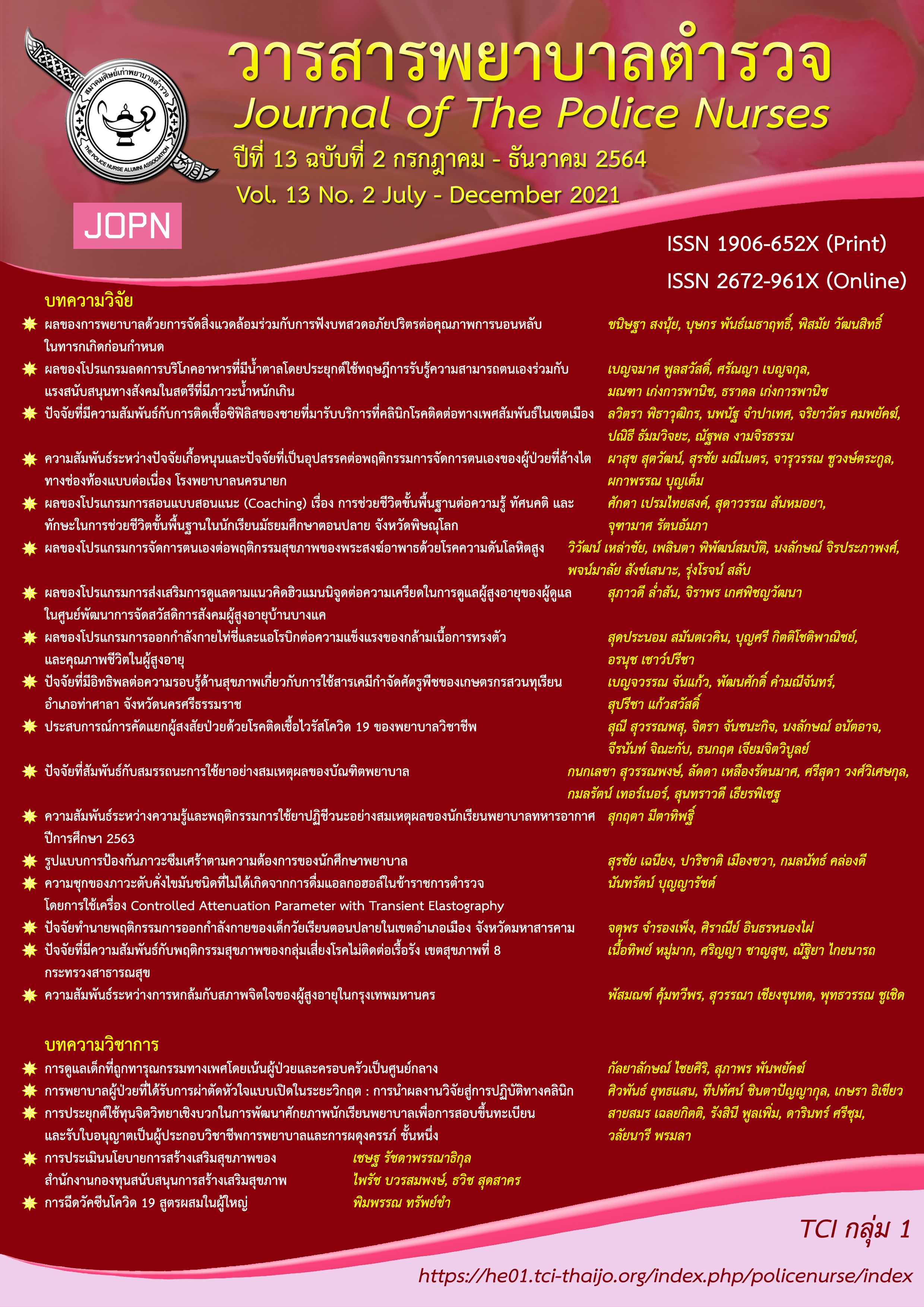FACTORS ASSOCIATED WITH COMPETENCY IN RATIONAL DRUG USE OF NURSING GRADUATES
Keywords:
competency in rational drug use, nursing graduates, attitude towards rational drug use, rational drug use didactic management, support from instructorsAbstract
This descriptive study was conducted to investigate the relationships among predisposing factors, which were learning achievements and attitudes towards Rational Drug Use (RDU), an enabling factor, which was RDU didactic management, and reinforcing factors namely support from instructors and the nursing graduates’ competency in RDU. Two hundred and seventy-three graduates of the bachelor of nursing science programs in Thailand in Academic Year 2019 were recruited. The research instruments included a set of questionnaires regarding attitude towards RDU, RDU didactic management, support from instructors, and nursing graduates’ competency in RDU. All questionnaires except the demographic data were checked for content validity indices and reliability coefficients, which were .91, .94, .96, and .96, respectively. The data were analyzed using descriptive statistics and Pearson’s correlation coefficients.
Data analysis revealed that attitudes towards RDU, RDU didactic management, and support from instructors had a significantly strong positive relationship with the nursing graduates’ competency in RDU (r = .651, .628, and .548, respectively). Meanwhile, learning achievement had no statistically significant relationship with the nursing graduates’ competency in RDU.
Downloads
References
Brydges, C. R. (2019). Effect size guidelines, sample size calculations, and statistical power in gerontology. Innovation in Aging, 3(4), 1-8.
Bunmusik, S., Chantra, R., & Heeaksorn, C. (2020). Knowledge attitude and behaviors in rational antibiotics use of nursing students southern college of nursing and public health network. Journal of Health Research and Innovation, 2(1), 25-36.
Charoensuk, S., Leungratanamart, L., Reunreang, T., Turner, K., & Theinpichet, S. (2020). An evaluation of competency in rational drug use of nursing graduates. Journal of The Royal Thai Army Nurses, 21(2), 158-168.
Faul, F., Erdfelder, E., Lang, A.-G., & Buchner, A. (2007). G*power 3: A flexible statistical power analysis program for the social, behavioral, and biomedical sciences. Behavior Research Methods, 39(2), 175-191.
Green, I. W., & Kreuter, M. W. (2005). Health program planning: An educational and ecological approach (4th ed.). New York, NY: Emily Barrosse.
House, J. S. (1981). Work stress and social support. Reading, MA: Addison- Wesley.
Manipantee, S. & Wiwatchankit, W. (2015). The relationship among education’s learning achievement, attitude in studying, and modification of study complementary and alternative therapies of nursing students. Kuakarun Journal of Nursing, 22 (2), 91-106.
Rational Use of Drug Subcommittee. (2017). Teacher’s guide for promoting rational drug use. Nonthaburi: Food and Drug Administration, Ministry of Public Health, Thailand.
Sarakshetrin, A., Rongmuang, D., Kaewraya, K., Sroisri, P., & Chaisuk, I. (2020). Competencies in rational use of antibiotics among nursing students in Prachomklao college of nursing, Phetchaburi province. The Southern College Network Journal of Nursing and Public Health, 7(2), 206-218.
Sulosaari, V., Huupponen, R., Hupli, M., Puukka, P., Torniainen, K., & Leino-Kilpi, H. (2015). Factors associated with nursing students’ medication competence at the beginning and end of their education. BMC Medical Education, 15(223), 1-11.
Thailand Nursing and Midwifery Council. (2018). Conclusion integrating the rational drug use curriculum into the bachelor of nursing science program. Retrieved from https://www.tnmc.or.th/images/userfiles/files/summarymed.pdf
Thailand Nursing and Midwifery Council. (2019). The handbook of learning and teaching management on the rational drug use into the bachelor of nursing science program. Chonburi: Danext Intercoperation.
Turner, K., Radabutr, M., Laokosin, N., Thadakant, S., & Vaisurasingha, L. (2019). An evaluation of the processes of integrating the rational drug use curriculum into the bachelor of nursing science program, academic year B.E. 2561. Journal of Health Science Research, 13(2), 103-116.
Ua-Kit, N., & Pensri, L. (2019). Utilization of the PRECEDE model in health promotion. Thai Red Cross Nursing Journal, 12(1), 38-48.
Downloads
Published
How to Cite
Issue
Section
License
Copyright (c) 2021 JOURNAL OF THE POLICE NURSES

This work is licensed under a Creative Commons Attribution-NonCommercial-NoDerivatives 4.0 International License.
ผลงานที่ได้ตีพิมพ์แล้วจะเป็นลิขสิทธิ์ของวารสารพยาบาลตำรวจ















